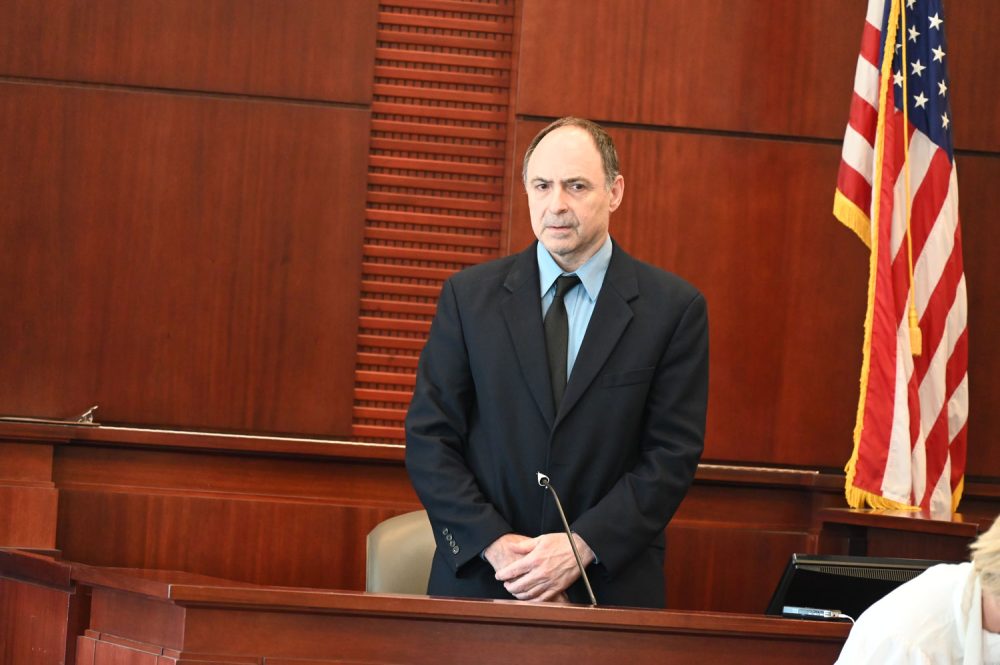
There was hardly a question that the way Palm Coast resident Philip Martin repeatedly touched, caressed, rubbed and massaged various body parts of the daughter of his by-then-deceased girlfriend was inappropriate–even he used the word–and creepy. Martin was in his mid-50s. The girl was 9, 10, 11 years old as the touching wandered over her and the years again and again.
The question, since Martin’s arrest on three molestation charges more than two years ago, was whether the inappropriateness was criminal, as the prosecution charged it very much was, or whether it was innocent if careless affection by a usually affectionate man, as the defense argued.
The question was whether Martin’s behavior warranted a first-degree molestation felony conviction punishable by life in prison, and two additional second-degree attempted molestation felonies, each punishable by up to 15 years in prison.
Not that the jury knew what the punishment would be. Under Florida law, juries are never told. They don’t even know if the charge is a felony or a misdemeanor, and enough jurors don’t know the difference. They are only asked to check “guilty” or “not guilty” on each charge’s line.
Concluding a trial that began on Monday, a jury of three men and three women today found Martin guilty on all counts after deliberating just under three hours. Martin will be sentenced, possibly to life in prison, on May 6 at 10:30 a.m. by Circuit Judge Terence Perkins, who presided over the trial.
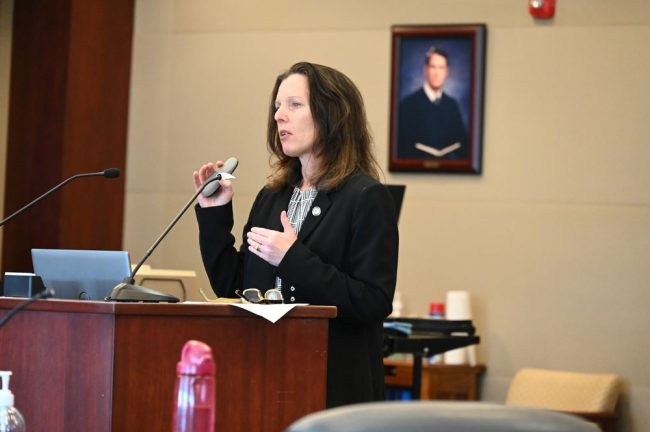
Martin knew the weight of the conviction. But he heard the verdict with the same expression he bore throughout the trial–an expression that could easily be mistaken for stoicism, but was really somewhere between vacant and incredulous. It was the same demeanor he brought to his interviews with detectives, his halting caution at every turn, his self-conscious care in the way he chose his words, projecting more calculation–and miscalculations–than earnestness.
It was not a typical case of molestation. There’d never been any accusations or actual touching of breasts or genitals, or anything more grave than that. Martin had himself complicated matters for himself by confessing in an interview with detectives that he had massaged the girl’s butt, which is categorized as a genital under law, and therefore led to the most serious charge. Since the girl was under 12, what would have been a second degree felony was aggravated to a first.
But the girl herself, in her Child Protection Team interview and again on the stand on Tuesday–she is now 13–was adamant, at least in some regards.
“He didn’t touch your buttocks inappropriately, did he?” Bill Bookhammer, the assistant public defender, asked her.
“No,” the girl said flatly.
In her testimony on Tuesday and again briefly on Wednesday, when she was recalled, she was always poised, sharp, clear in every response, showing no hint either of bitterness nor spite, and none of the surliness common to teens, especially on the stand. Nor did she seem intimidated by the surroundings, her repeated uses of “like” the only betrayal of middle school vernacular. She had come across equally sharp in her video interview with the protection team when she was two years younger (it was shown in court), and in her deposition, according to court records.
“And he never touched your chest or put his hands on your chest, did he?” Bookhammer asked her.
“No.”
Yet to Melissa Clark, the assistant state attorney prosecuting the case, the girl had testified just as clearly: “He was, like, massaging my legs and massaging my private areas… he massaged me on my top area my bottom area,” descriptions she clarified meant her breast area and her genital area. “He would try to go on the back of my shirt like under my shirt and he would try to, like, get around me, but I would never let him, like I would try to get away from him.”
“Now, you mentioned that he would massage your back, he massaged your legs, did he massage anywhere else?” Clark asked her.
“Yes, on my lower private part.”
“And when you say your lower private part, what part of your body are you talking about?”
“My vagina.”
The girl stepped down from the witness stand and showed the jury how he touched her, in a place the prosecutor described as “below the belt line,” which does not leave room for anatomical doubt. That was acknowledged even by the defense in a pre-trial motion.
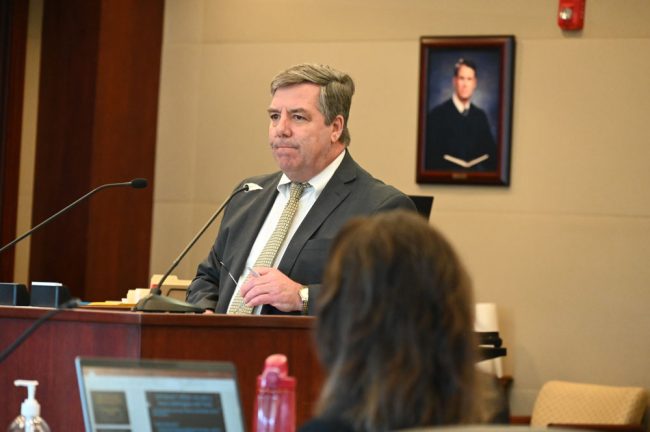
Yet Clark did not allude to that explicit description in her closing arguments. The first-degree felony charge applied to the allegation of Martin massaging her butt, not her vagina, and for whatever reason, the state had not filed a similar charge regarding the more frontal assault.
Bookhammer tried to discredit the charge about the butt with one of his more convincing arguments on the final day: “She said it never happened, flat out, not guilty. If you want to reasonable doubt about anything at all, the fact of the state’s own witness said that it never happened, is not guilty. This isn’t ‘it’s possible’ or ‘it’s probable,’ ‘maybe’ ‘well, he said he did it, it must have been true.’ Their own witness said it never happened.” He added, referring to the prosecution: “No matter how much they want to rely on Mr. Martin’s own statement, they can’t talk around the fact at all that that girl never one time in two and a half years said Mr. Martin rubbed her rear, let alone massage her.”
Bookhammer’s conclusions on that count were indisputable. If the jurors had understood the meaning of “reasonable doubt” as both attorneys explained it during jury selection, they could not possibly not find reasonable doubt on the first count. But they did.
Bookhammer’s parallel strategy to ensure a not guilty verdict on that count may have backfired. He hired a forensic psychologist, Bruce Frumkin (a “hired gun,” the prosecutor unfairly called him: prosecutors often hire their own expert mercenaries, too), whose testimony tried to convince the jury that so much of what Martin had told Sgt. Frank Gamarra, the lead detective on the case, in two recorded interviews, was under duress, that his confessions–including Martin’s own statements that he’d rubbed the girl’s butt–were false, that Gamarra’s technique had led Martin to make the statements, that Martin had felt under assault and just wanted the interviews to be over.
Bookhammer had Gamnarra describe his years as a Marine to imply that Gamarra was a tough, intimidating guy who brought that bearing to bear on Martin–an approach Gamarra said he “definitely” did not project. Bookhammer then, in a long cross-examination of Gamarra that stretched from Tuesday afternoon to Wednesday morning, highlighted differences between the questions Gamarra posed Martin and Martin’s answers. Bookhammer wanted to draw the picture of an investigative interview that presumed Martin guilty of being a “child molester,” as Bookhammer put it, though the girl had not described being touched
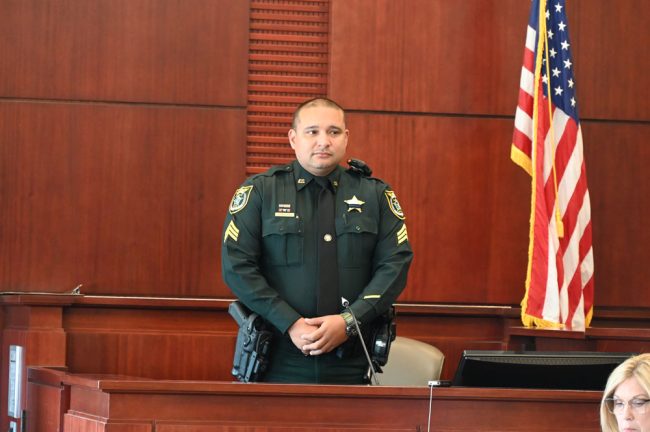
Martin himself at one point described the first, 50-minute interview with Gamarra as if he were being tortured. “I felt like I felt assaulted. I felt like I had been beaten up,” he said on the stand. “The more it continued the more helpless I felt. I felt they weren’t there to do anything but get the answers they were looking for.” (Gamarra was with detective Fiona Ebrill.) He said they were seeking “answers that implied guilt.” He felt they would keep asking until they heard “the answers that they wanted to hear.”
But that’s not what jurors saw when the prosecution heard the first interview, then watched the second, with Gamarra sitting a few feet away from them, on the stand. They saw the same Gamarra they’d see responding to Bookhammer’s questions: even tempered, almost laid back, unassuming, never snarky or aggressive. He did ask the same questions repeatedly, but that’s not unusual of detectives probing for answers.
There were those times when Martin would allow, or more apparently entice, the girl to sit on his lap, with bait: “He gives me his phone so I can be occupied,” she’d said in her Child Protection Team interview, a devastating line somehow left out of the state’s closing arguments. Gamarra had asked Martin if he’d moved around to maximize his pleasure with the girl on his lap, and Martin replied he had. It all went to a whole line of questioning about what erections he’d had and why. Martin contradicted himself about whether he did or did not ejaculate while the girl was sitting on his lap.
On the stand, he couldn’t explain why he said what he said to the detective, answering in a meander of what he recalled and couldn’t recall, until Bookhammer asked him if what he’d said was true.
“No, it wasn’t true,” Martin said.
Why say it then? “I just accepted everything they were saying,” he said. Martin is laconic, but no push-over: the jurors could see that, too. And his claim seemed to fall apart the moment he conceded that yes, even after Gamarra and Ebrill left, feeling him in shreds, he called Gamarra again right away, wanting to talk more. In person. He wanted to know if he was in trouble.
Bookhammer and Frumkin, the psychologist, went to great lengths to make Martin look like a textbook case of false confession. But it became just that: textbookish and academic on one side, lawyerly and rationalizing on the other. The men were piling up ramparts of jargon to defend a third man against a young girl’s comparatively simple and unexaggerated claim that the third man had made her feel uncomfortable again and again, touching her in ways she knew he shouldn’t, and distracting her in ways she knew were meant to give him the free hand she would not allow.
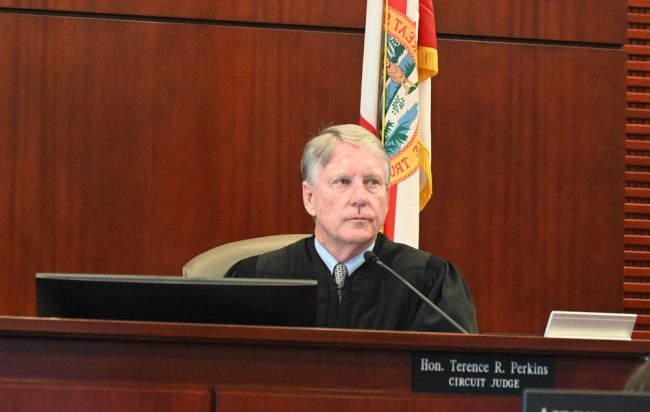
She had not spoken up before because she herself imagined he was seeing her late mother in her, that he was in a “coma” and his feelings were taking over, but she was also afraid of him: he used to yell at her mother, and she didn’t want to anger him. Finally, she told her grandmother (who testified on the first day).
Several members of his family or friends had been in the audience at various parts of the trial. None were there when the clerk read the verdict and polled the jury. The victim’s grandmother sat in the courtroom with a companion, and cried. Martin and Bookhammer, exchanged barely a few words.
It wasn’t long before Martin was ushered out the way he came in, through the side door reserved for defendants, back to the county jail, where he’s spent the last 840-some days since his arrest in November 2019. He had a $200,000 bond that he could afford to post. Perkins revoked it today. Martin, formerly of 95 Wedgewood Lane in Palm Coast, marked his 56th birthday in court on Tuesday. (When Bookhammer asked him his age the next day, Martin said, “56, I think?”) He’d been an Uber driver who in his career had been a pressman for the Wall Street Journal, a New York Times Regional Group newspaper, and the Daytona Beach News-Journal, among others.
He’d met the girl’s mother in 2009 at the YMCA. Over a year later things turned romantic. She moved in with him, along with her two children, the girl and her younger brother. Martin said he did not display physical attention to the children nor favor one over the other, though he considered himself an affectionate person. That only started after the girl’s mother died in 2017 of an overdose, after the couple had stopped living together, and when the children were 7 and 9.
Only then he became affectionate with the girl, and only with the girl. And when others weren’t looking.





























Dennis says
Lock him up for good. Sad story for the girl. I hope she is OK. Very sad.